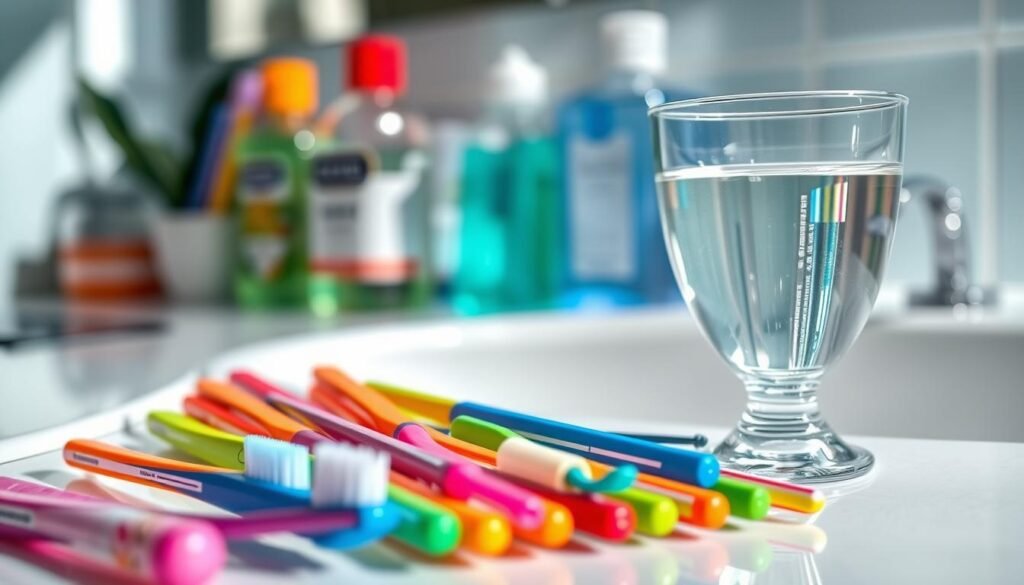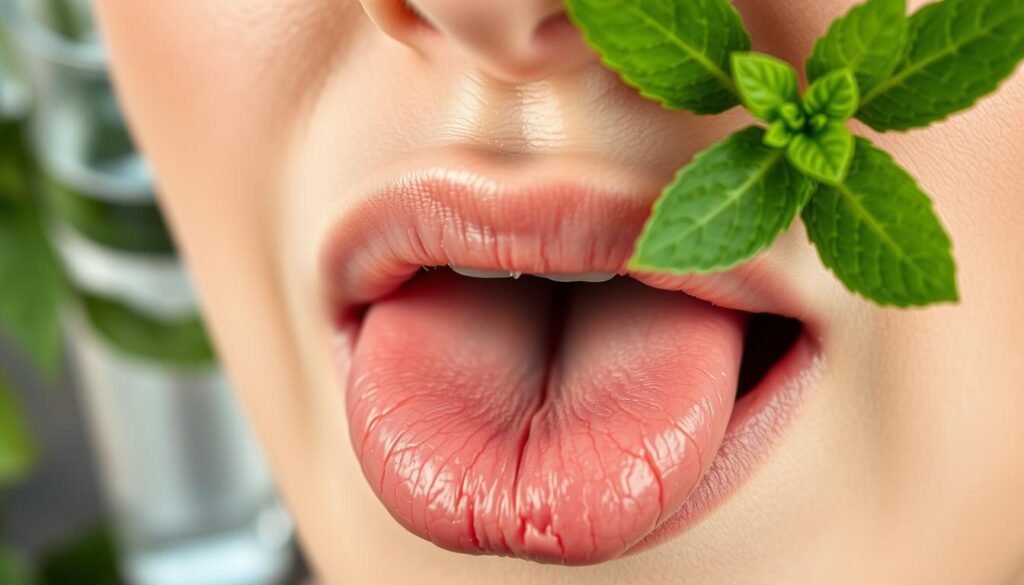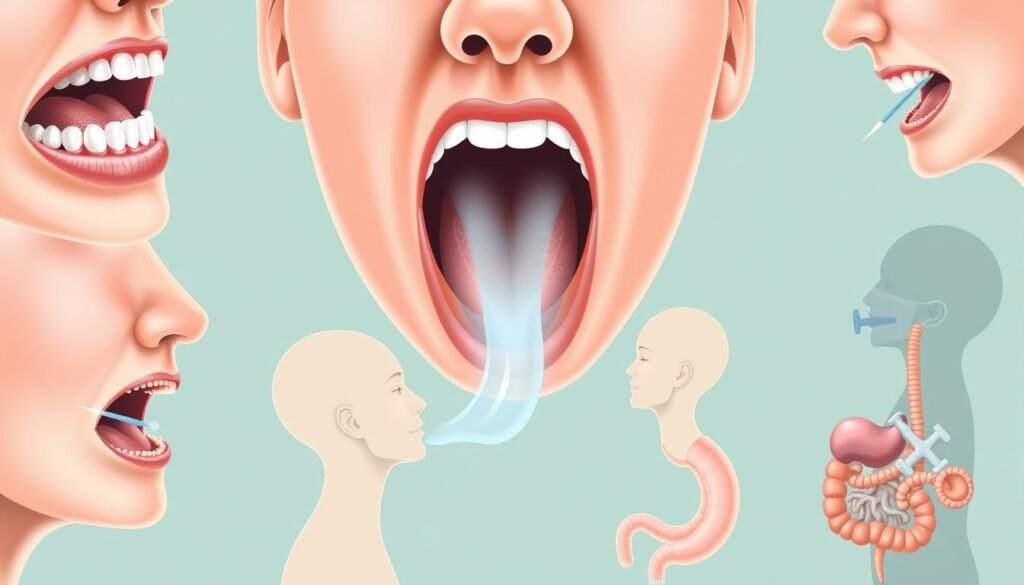Ever caught a whiff of your breath and wished it was fresher? Halitosis, or bad breath, is common and can affect our daily lives. Knowing what causes bad breath is key to a healthy smile.
Poor oral hygiene is a big reason for bad breath. Not brushing and flossing often lets food particles stay in your mouth. This creates a perfect spot for bacteria to grow, causing bad smells. Smoking also leads to gum disease, which is another bad breath cause.
Certain foods, like garlic and onions, can make your breath smell bad. This is because their compounds get into your bloodstream and then out through your breath. Dry mouth, which happens when you don’t have enough saliva, also makes bad breath worse. Saliva helps keep your mouth fresh.
Health issues like infections, digestive problems, and even chronic diseases can cause bad breath. Some medicines can also dry out your mouth, making bad breath worse.
Knowing what causes bad breath helps us take better care of our mouths. We can improve our oral hygiene and address health problems. Regular dental visits and cleanings are also important for keeping your breath fresh.
Key Takeaways
- Poor oral hygiene, including inadequate brushing and flossing, is a leading cause of bad breath.
- Certain foods, such as garlic and onions, can contribute to unpleasant breath odor.
- Dry mouth, caused by medication or health conditions, can reduce saliva production and lead to halitosis.
- Underlying health issues, like respiratory infections and digestive disorders, may also be the source of bad breath.
- Regular dental check-ups and professional cleanings can help manage and prevent persistent bad breath.
Understanding Halitosis: Definition and Basic Facts
Halitosis, also known as chronic bad breath, affects about 25 percent of people worldwide. It happens when the mouth smells bad due to food breakdown and bacteria. This is a common oral health issue.
What Makes Breath Smell Bad
The tongue’s uneven surface traps food and bacteria. This leads to foul smells from volatile sulfur compounds. These compounds come from bacteria and amino acids in food.
Impact on Daily Life and Social Interactions
Bad breath can hurt a person’s self-confidence and social life. Some people know they have bad breath, while others don’t. It can make people feel shy and avoid social events.
The Role of Bacteria in Bad Breath
Bacteria are key in causing halitosis. Tongue bacteria break down food proteins, making bad smells. Good oral hygiene is vital to fight bacteria and prevent bad breath.
“Halitosis is the third most common reason that people seek dental care, following tooth decay and gum disease.”
Common Cause of Bad Breath: From Food to Lifestyle
Our breath quality is influenced by many factors. This includes the foods we eat and our daily habits. Foods like garlic, onions, and spicy dishes can cause bad breath. This is because their compounds break down in our mouths and get absorbed into our blood.
Poor oral hygiene also plays a big role. Not brushing and flossing enough lets bacteria grow. These bacteria then produce foul-smelling byproducts.
Lifestyle choices, like smoking and drinking alcohol, can make bad breath worse. Smoking not only causes bad breath but also increases gum disease risk. Alcohol dries out our mouths, reducing saliva. Saliva is key to keeping our breath fresh.
Dry mouth is another cause of bad breath. It can be due to dehydration, some medications, or medical conditions. Saliva cleanses our mouths and neutralizes bacteria. Without enough saliva, bacteria can cause bad odors.
Some diets can also affect our breath. Low-carb diets, for example, can lead to a sweet or fruity breath smell. On the other hand, diets high in sugar and starches can damage teeth and cause bad breath.
To prevent and manage bad breath, we need to take care of our oral health. We should also be mindful of what we eat and address any medical issues. By doing this, we can have fresh breath and improve our overall health.
| Cause | Description |
|---|---|
| Food Odors | Certain foods, such as garlic, onions, and spicy dishes, can lead to unpleasant odors as their compounds are broken down in the mouth and absorbed into the bloodstream. |
| Smoking and Alcohol | Smoking not only causes bad breath but also increases the risk of gum disease, while alcohol can dry out the mouth, reducing saliva production and leading to bad breath. |
| Dry Mouth | Dry mouth, whether caused by dehydration, certain medications, or underlying medical conditions, can contribute to bad breath as saliva plays a crucial role in maintaining fresh breath. |
| Dietary Factors | Low-carbohydrate diets high in protein can lead to increased ketone production and a sweet, fruity, or acetone-like breath odor, while a high-sugar diet can fuel the growth of bacteria that produce acids, damaging teeth and contributing to bad breath. |
By addressing these common causes of bad breath, we can improve our oral health and enjoy fresh, confident breath.
The Critical Connection Between Oral Hygiene and Bad Breath
Good oral hygiene is key to avoiding bad breath, or halitosis. If we ignore our teeth, food, plaque, and bacteria can build up. This buildup leads to bad smells. By brushing and flossing well, and getting regular dental cleanings, we can fight bad breath.
Proper Brushing and Flossing Techniques
Brush your teeth twice a day and floss every day. Brushing should be gentle and circular, covering all tooth surfaces. Flossing gets rid of food and plaque that brushes can’t. This stops bad smells from forming.
Importance of Regular Dental Cleanings
Even with good home care, dental cleanings are vital. A hygienist can remove tough tartar that holds bacteria. Catching dental problems early, like gum disease, helps prevent bad breath.
Tongue Cleaning and Maintenance
The tongue can cause bad breath by holding bacteria and food. Brushing or using a tongue scraper can clean it. Keeping the tongue clean is a crucial part of fighting bad breath.
By focusing on dental hygiene, we can greatly reduce bad breath and keep our breath fresh.

“The key to fresh breath is maintaining a healthy mouth through consistent, thorough oral hygiene practices.”
How Dry Mouth Contributes to Halitosis
Dry mouth, or xerostomia, is a big reason for bad breath. Saliva helps clean the mouth and get rid of smells. Without enough saliva production, more oral bacteria and food bits stay in the mouth.
Dry mouth can happen because of some medicines, gland issues, or mouth breathing. It’s normal when we sleep, causing “morning breath.” But, having dry mouth all the time can make bad breath worse and harm our teeth and gums.
Studies show that dry mouth traps bacteria that cause smells because there’s less saliva. Saliva protects teeth with minerals and salts, fighting off bacteria. Without enough, we risk tooth decay, gum disease, and bad breath.
| Causes of Dry Mouth | Consequences of Dry Mouth |
|---|---|
| Medications (e.g., antidepressants, blood pressure drugs) Dehydration Certain health conditions (e.g., Sjögren’s syndrome, diabetes) Radiation therapy Smoking and excessive alcohol consumption | Bad breath (halitosis) Tooth decay Gum disease Difficulty in speaking and eating Oral thrush or mouth sores |
To fight bad breath from dry mouth, drink lots of water, chew sugarless gum, and use mouthwash without alcohol. Also, keep your mouth clean. Seeing a dentist can help find and fix the root causes of dry mouth and bad breath.

“Dry mouth, also known as xerostomia, is a common cause of bad breath. Adequate saliva production is necessary for oral functions like washing away food particles and neutralizing acids.”
Medical Conditions That Can Cause Bad Breath
Poor oral hygiene is often the main reason for bad breath. But, many health conditions can also play a part. Knowing how medical issues can lead to bad breath helps in finding a solution.
Respiratory Tract Infections
Issues like sinus infections or bronchitis can cause bad breath. Bacteria feed on mucus, leading to a bad smell.
Digestive System Issues
Problems with the digestive system, like GERD (acid reflux), can also cause bad breath. Stomach acid or undigested food can make your breath smell sour.
Chronic Health Conditions
Chronic conditions, such as diabetes, can affect your breath. Tonsil stones, small formations in the tonsils, can also cause bad breath. Liver or kidney problems may change how your breath smells.
If you have bad breath and brush your teeth well, see a doctor. They can find the cause and help you feel better.

“Addressing the underlying cause is key to resolving persistent bad breath.”
The Impact of Diet and Smoking on Breath Odor
What we eat and whether we smoke can really affect our breath. Knowing how these habits link to bad breath is key to keeping our mouth fresh and healthy.
Foods like garlic, onions, and some spices can make our breath smell bad. This happens because their compounds get into our blood and then out through our lungs. Also, diets rich in protein and low in carbs can make our breath smell different. Smoking not only makes our breath smell bad but also raises the risk of gum disease and mouth cancer. It can also dry out our mouth, making bad breath worse.
Studies show that smokers are more likely to have bad breath than non-smokers. A big study found that smokers were more likely to have bad breath, no matter how it was measured. Smoking messes with the good bacteria in our mouth, makes bad bacteria grow more, and can make us produce less saliva. All these things can make our breath smell worse.
- The big study found a lot of variation between studies (I2 = 91%), but when they looked at fewer studies, the variation was smaller (I2 = 0–65%). Still, the results were pretty consistent.
- People who had ever smoked didn’t have a higher risk of bad breath than those who never smoked.
- The results were the same whether people said they had bad breath or if it was checked with a special device.
Eating well and quitting smoking can really help our breath smell better. Tongue scraping, using good mouthwashes, and drinking plenty of water can also help fight the bad effects of what we eat and smoke on our breath.
“About 25% of people with bad breath have it so badly it affects their daily life. They get nervous, feel embarrassed, and avoid being around others.”
By knowing how diet and smoking affect our breath, we can do things to keep our breath fresh and confident. This can help our overall health and how we feel about ourselves.

Medications and Their Effect on Breath Quality
Many common medications can affect our breath quality. They often cause dry mouth, or xerostomia. Antihistamines, decongestants, antidepressants, and some blood pressure medications are common offenders. These drugs can mess with saliva production and flow, which is key for fresh breath.
Some medications can also release chemicals that smell bad. This is true for antifungals, steroids, and certain chemotherapy drugs. These chemicals can be carried on our breath, making it unpleasant.
Common Medications Causing Dry Mouth
- Antihistamines, used to treat allergies
- Decongestants
- Antidepressants
- Blood pressure medications
- Dietary supplements
- Painkillers
- Diuretics
- Acid reducers
Managing Medication-Related Breath Issues
If your meds are causing bad breath, there are ways to handle it. Talk to your doctor about switching to different medications. Some might be less likely to dry out your mouth. Using saliva substitutes or chewing sugarless gum can also help.
Good oral hygiene is key. Brush, floss, and clean your tongue regularly. This helps fight bad breath caused by medications.
| Medication Type | Potential Effect on Breath Quality |
|---|---|
| Antihistamines | Dry mouth, leading to bad breath |
| Antidepressants | Dry mouth, leading to bad breath |
| Blood Pressure Medications | Dry mouth, leading to bad breath |
| Chemotherapeutic Agents | Release of odorous chemicals in the body, contributing to bad breath |
Good oral hygiene and managing dry mouth are vital for fresh breath. If bad breath persists, see your doctor or dentist for help.
The Role of Saliva in Maintaining Fresh Breath
Saliva is key to keeping our mouths healthy and our breath fresh. It cleans our mouths by washing away food and neutralizing acids. It also keeps our oral microbiome balanced.
Having enough saliva helps prevent dry mouth and stops bacteria that cause bad breath. Chewing sugar-free gum or sucking on sugar-free candies boosts saliva. Drinking water also helps keep saliva flowing.
If you have dry mouth, your dentist might suggest artificial saliva. This can help keep your mouth fresh.
Saliva also fights off bacteria in our mouths. It makes it hard for bacteria to grow by neutralizing acids and removing food. So, it’s important to keep saliva flowing to prevent bad breath.
“Saliva is the unsung hero of oral health, and its role in maintaining fresh breath cannot be overstated. By understanding the importance of this natural fluid, we can take proactive steps to keep our mouths healthy and our breath smelling its best.”
In short, saliva is crucial for fresh breath and oral health. By chewing sugar-free gum or drinking water, we can help keep our mouths clean. Knowing how important saliva is helps us prevent dry mouth and keep our breath smelling good.
Professional Treatment Options for Chronic Bad Breath
If you’re dealing with bad breath that won’t go away, you might need professional help. A dental expert can find the cause by checking your mouth and looking at your health history.
Fixing chronic bad breath often means a few things. You might need a deep clean at the dentist, fixing any gum or tooth problems. You might also get mouth rinses that kill bacteria. Sometimes, you’ll need to see a specialist to tackle tough issues.
If your bad breath comes from a health problem like a cold or stomach issue, you should talk to your doctor. The goal of treatment is to find and fix the main problem. This helps your mouth stay healthy for a long time.
Studies show that 30 to 50 percent of people worldwide have bad breath all the time. While it can’t be completely cured, the right treatment and care can keep it under control.
- Going to the dentist regularly is key to stop and treat bad breath. This includes cleaning your teeth and checking for gum disease or cavities.
- Doctors might give you special mouthwashes or toothpaste to fight the bacteria that cause bad breath.
- In some cases, you might need dental work like fillings, crowns, or implants to fix problems that cause bad breath.
If you’re worried about bad breath, don’t wait to see an oral health specialist. With the right treatment and care, you can feel confident and have fresh breath every day.
Conclusion
Maintaining fresh breath is about good oral hygiene, lifestyle choices, and knowing about health issues. Brushing, flossing, and tongue cleaning are key to preventing bad breath. Drinking water, avoiding tobacco, and watching what we eat also helps a lot.
Regular dental visits are vital for catching and treating oral health problems early. If bad breath doesn’t go away, seeing a dentist is a good idea. They can check for serious health issues and help fix the problem.
By taking care of our teeth and mouth, we can keep our breath fresh. This not only makes us feel better but also boosts our confidence when we talk to others.
Research shows that about 25% of people deal with bad breath often. Most bad breath comes from inside the mouth, like a coated tongue or poor hygiene. Keeping our mouth clean by brushing, flossing, and cleaning our tongue can really help avoid bad breath.
FAQ
What is halitosis?
Halitosis, or bad breath, is a common problem. It’s when your breath smells bad. It can happen for many reasons, like not brushing your teeth well, eating certain foods, or having dry mouth.
What are the primary causes of bad breath?
Bad breath can come from eating foods like garlic or onions. It can also happen if you don’t brush your teeth well, use tobacco, or have a dry mouth. Bacteria in your mouth can make your breath smell bad.
How can proper oral hygiene help prevent bad breath?
Keeping your mouth clean is key to avoiding bad breath. Brushing, flossing, and cleaning your tongue helps. It removes food and plaque, which can cause bad smells.
How does dry mouth contribute to bad breath?
Dry mouth, or xerostomia, is a big reason for bad breath. Saliva helps clean your mouth and get rid of bad smells. Without enough saliva, bacteria and food can stay longer, making your breath worse.
What medical conditions can cause or contribute to bad breath?
Many health issues can lead to bad breath. This includes infections, digestive problems, diabetes, and tonsil stones. If your breath is always bad, see a doctor.
How do diet and smoking affect breath odor?
What you eat can affect your breath. Foods like garlic and onions can make your breath smell. Smoking also makes your breath smell bad and can harm your mouth and teeth.
Can medications affect breath quality?
Yes, some medicines can make your breath smell. This is often because they dry out your mouth. Talk to your doctor about changing your medicine if it affects your breath.
What is the role of saliva in maintaining fresh breath?
Saliva is very important for fresh breath. It washes away food and acids, and keeps your mouth healthy. Having enough saliva helps prevent dry mouth and bad breath.
What are the professional treatment options for chronic bad breath?
If bad breath doesn’t go away, you might need a dentist’s help. They can find the cause and treat it. This could include cleanings, fixing teeth problems, or using special mouthwashes.
